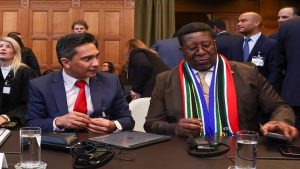Two grade 12 learners in the Western Cape, taking Marine Sciences as a school subject, have been chosen to participate in the SEAmester programme on the polar research vessel, the SA Agulhas Two.
The learners will join university students and learn from experts in oceanography, fisheries, biogeochemistry, and biology on the expedition.
The teaching and learning experience will last 10 days.
The SEAmester programme is usually reserved for post-graduate students from universities across South Africa. It was initiated by Professor Isabelle Ansorge from the University of Cape Town and funded by the Department of Science and Innovation.
Future marine biologists, oceanographers, and others in the field of marine sciences will explore and learn from top professionals.
The SEAmester coordinator, Tahlia Henry, says this experience will help the learners better understand what to expect in the marine sciences field.
Henry says, “We have had school kids on board before and we thought what better than to have these kids that have now started with marine science as a subject, who are learning a lot of what we get to learn about in the first year at university. Now they get to see everything that they have done in high school, now they get to see it in action. Not only that, they are on the precipice of going to university within the next year or two, so this is a great investment for us because we are seeing the benefit of what the programme has done and … this is sort of the where to from here and they get to see that this is where you going towards.”
VIDEO | Two learners part of Class Afloat Programme:
After writing an essay and going through an interview process, Aimee Stollie was selected for the programme.
She says, “I’m studying it to understand it better because I love mystery which is why I love science because it’s got problem-solving and questions and the ocean is only 5% explored, 95% unexplored, I’m not sure. To be fair, we know more about space than we do about the water on our own planet. It’s just something that bugged me into studying science like what is hiding underneath the water? I have no idea and that’s what I want to find out.”
Joining her is future marine biologist Akhona Zondo, who wants to help spread the word about protecting the world’s oceans.
Zondo says, “I’m very interested in it because I think I’m more concerned about nature and conservation and it brings forward those ideas into preserving nature. It focuses on something that is very unique, it’s very unique and it’s something that someone can pursue as a career and as I’ve mentioned I’m concerned about nature and it’s like building steps towards it and the ocean, I’m very passionate about the ocean.”
Since 2020, Marine Sciences has been piloted in five schools as a formal subject. Currently, more than 400 learners take the subject in the Western Cape and it has been expanded to other provinces. The opportunity to travel and learn on the Agulhas helps solidify what is taught in the classroom.
The curriculum planner for Marine Sciences, Dr. Mariette Wheeler says, “Facts we know these days, but we can easily get a hold of facts. But instilling that love for the ocean that I want to be part of this. As well as potentially influencing their career choice because they are going to be working with people who’ve been in marine sciences for many years and I’m sure some of that excitement and passion for the field will also be instilled in them. It’s also women in science, both girls of them going. Both of them in their essays wrote that they would love to spread environmental awareness and when they get off the ship, I’m pretty sure all of their classmates will hear about it.”
The semester at sea, or SEAmester, will include a journey up the country’s Eastern Coast as well as a short voyage out to deep waters 400 kilometres off the coast.
Story by: Amahle Du Toit






